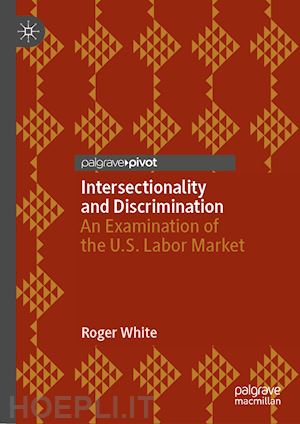
Questo prodotto usufruisce delle SPEDIZIONI GRATIS
selezionando l'opzione Corriere Veloce in fase di ordine.
Pagabile anche con Carta della cultura giovani e del merito, 18App Bonus Cultura e Carta del Docente
In 1989, Kimberlé Crenshaw coined the term “intersectionality” to describe the interdependent and overlapping systems of discrimination and disadvantage that result from the interconnected nature of social categorizations. These categories include, but are not limited to, disability, gender identity, nationality, race, and socioeconomic class. In recent years, we have witnessed increased societal interest in the notion of equal economic, political, and social rights. This has commonly manifested in a desire for equality of opportunity (i.e., social justice). This book applies an intersectional approach to examine a specific facet of inequality – namely, the presence and magnitude of wage discrimination in the U.S. labor market.
This book accomplishes several objectives. It introduces intersectional analysis for readers who are unfamiliar with the topic. The book identifies intersectional wage discrimination for a large number of worker groups that are defined by multiple intersecting identities (i.e., the personal characteristics of Hispanic ethnicity, nativity, race, and sex). It also documents variation in wage differentials both between worker groups (i.e., contemporaneously) and within groups (i.e., intertemporally). Finally, given the policy relevance of our topic, it is fitting that the final chapter is devoted to corresponding conclusions.
Roger White is Professor of Economics at Whittier College (USA), where he holds the Douglas W. Ferguson Chair in International Economics. Roger is the author of more than forty published research articles and book chapters, and he is the author or editor of eight books, including four works published by Palgrave Macmillan: Multidimensional Poverty in America: The Incidence and Intensity of Deprivation, 2008-2018 (2020); Public Opinion on Economic Globalization – Considering Immigration, International Trade, and Foreign Direct Investment (2017); Measuring Multidimensional Poverty and Deprivation: Incidence and Determinants in Developed Countries (2017); and Making Sense of Anti-Trade Sentiment: International Trade and the American Worker (2014).











Il sito utilizza cookie ed altri strumenti di tracciamento che raccolgono informazioni dal dispositivo dell’utente. Oltre ai cookie tecnici ed analitici aggregati, strettamente necessari per il funzionamento di questo sito web, previo consenso dell’utente possono essere installati cookie di profilazione e marketing e cookie dei social media. Cliccando su “Accetto tutti i cookie” saranno attivate tutte le categorie di cookie. Per accettare solo deterninate categorie di cookie, cliccare invece su “Impostazioni cookie”. Chiudendo il banner o continuando a navigare saranno installati solo cookie tecnici. Per maggiori dettagli, consultare la Cookie Policy.